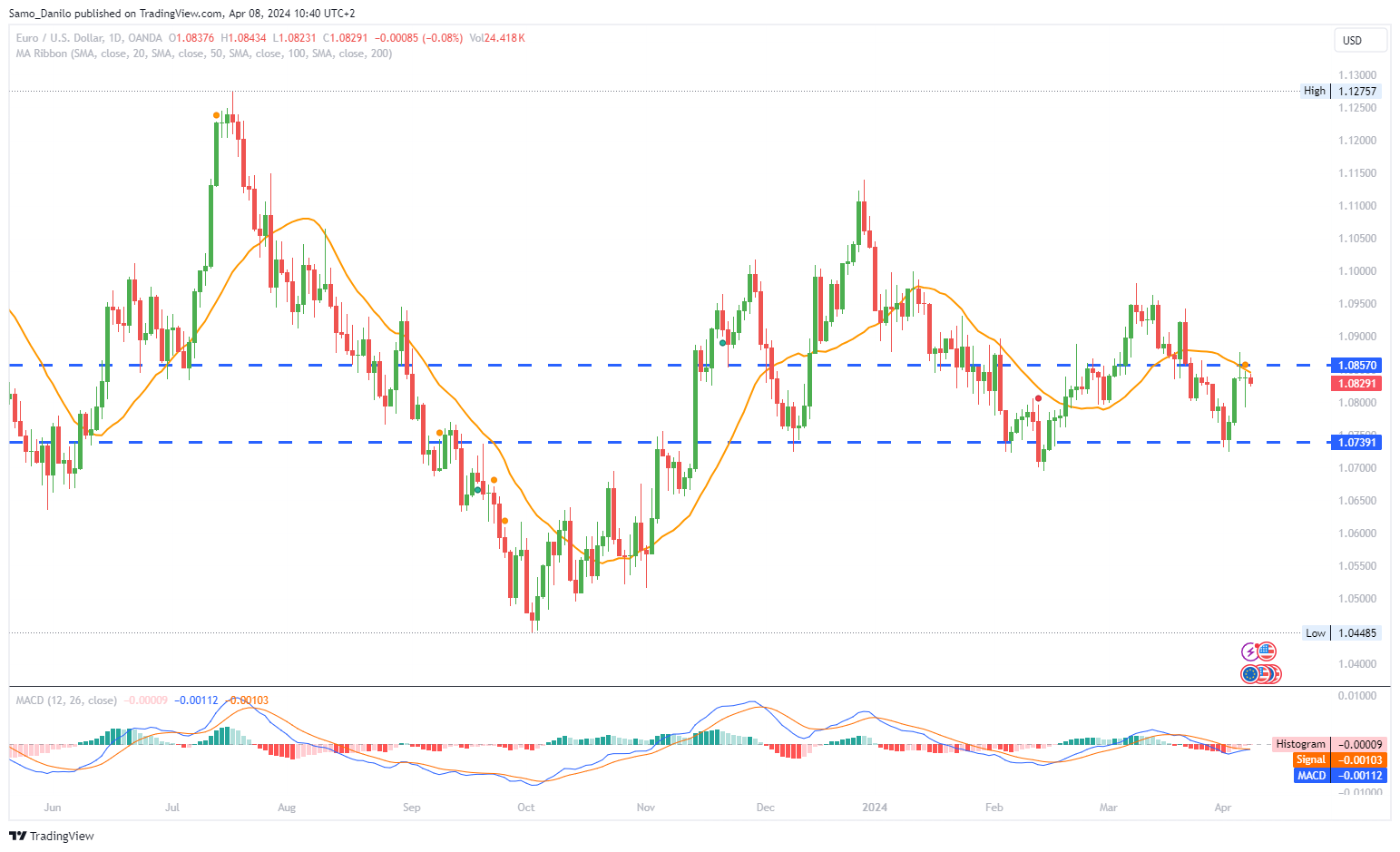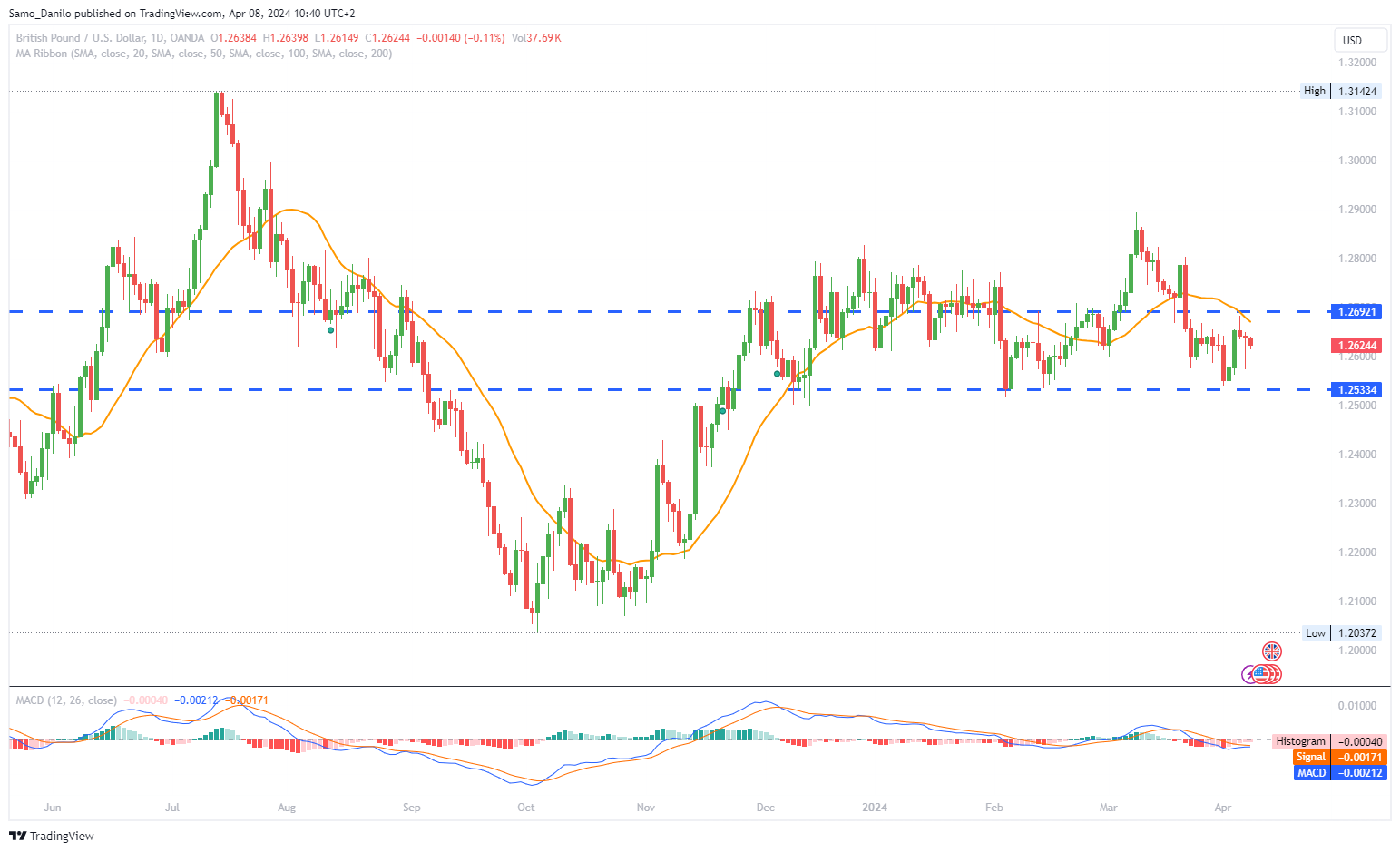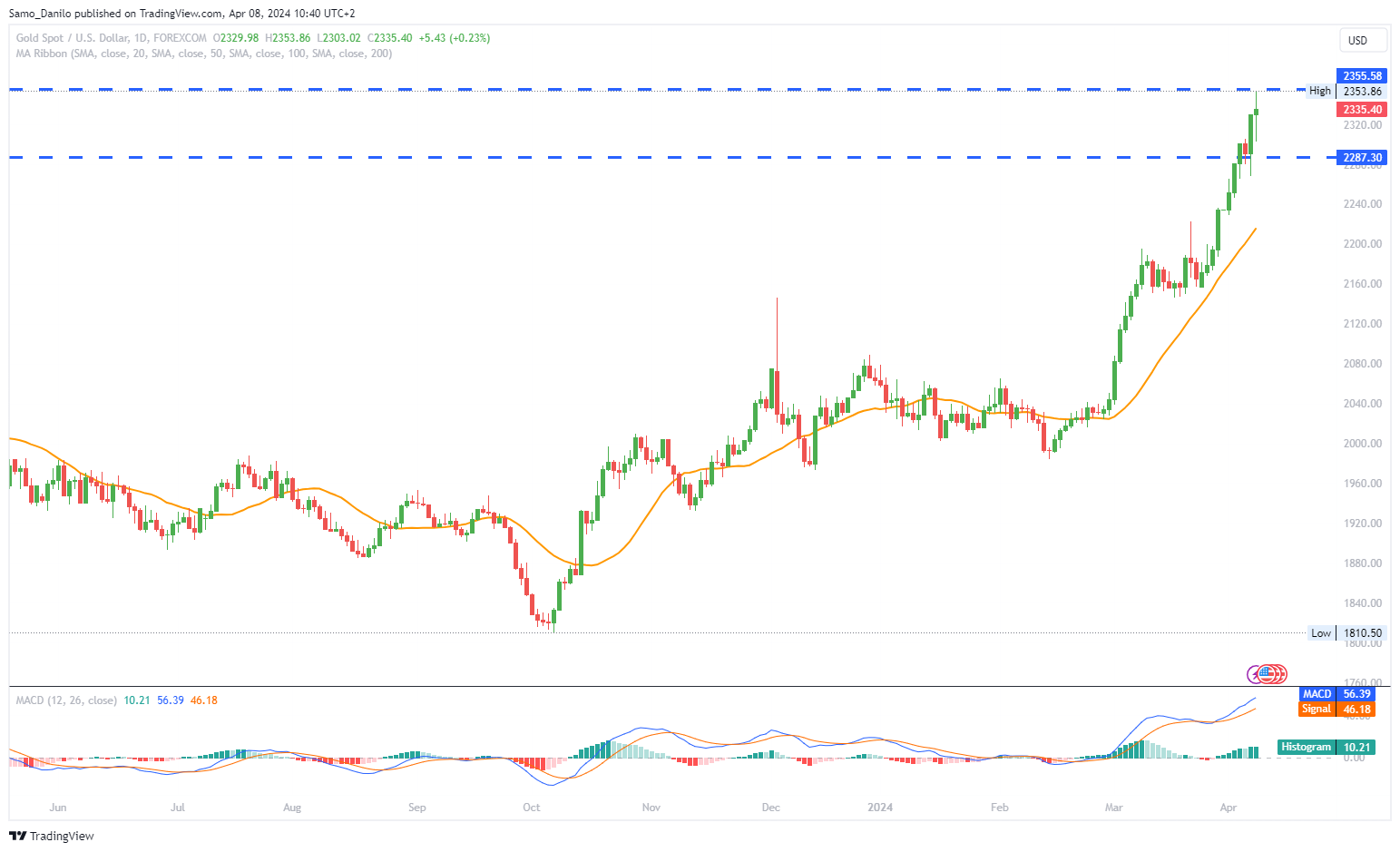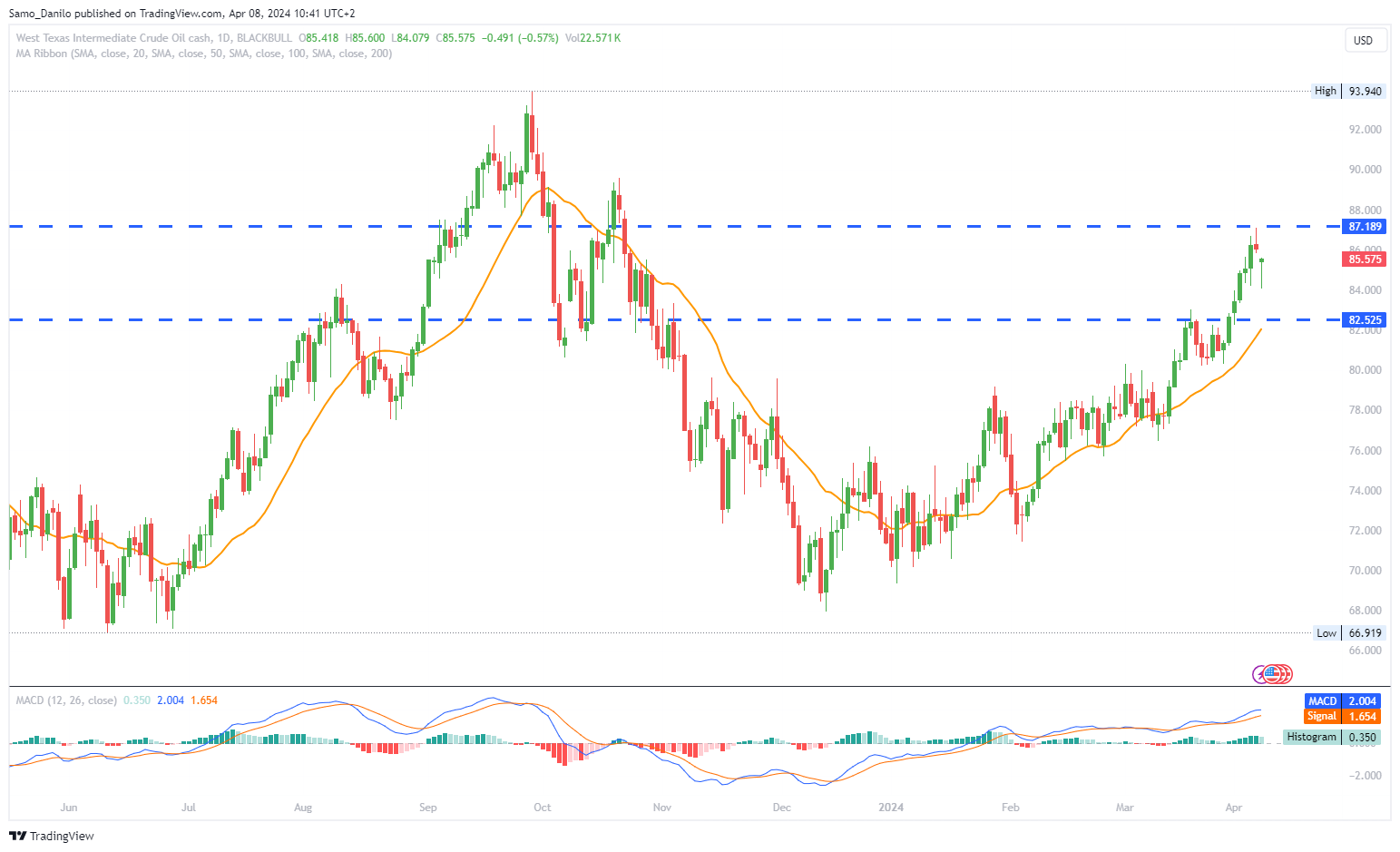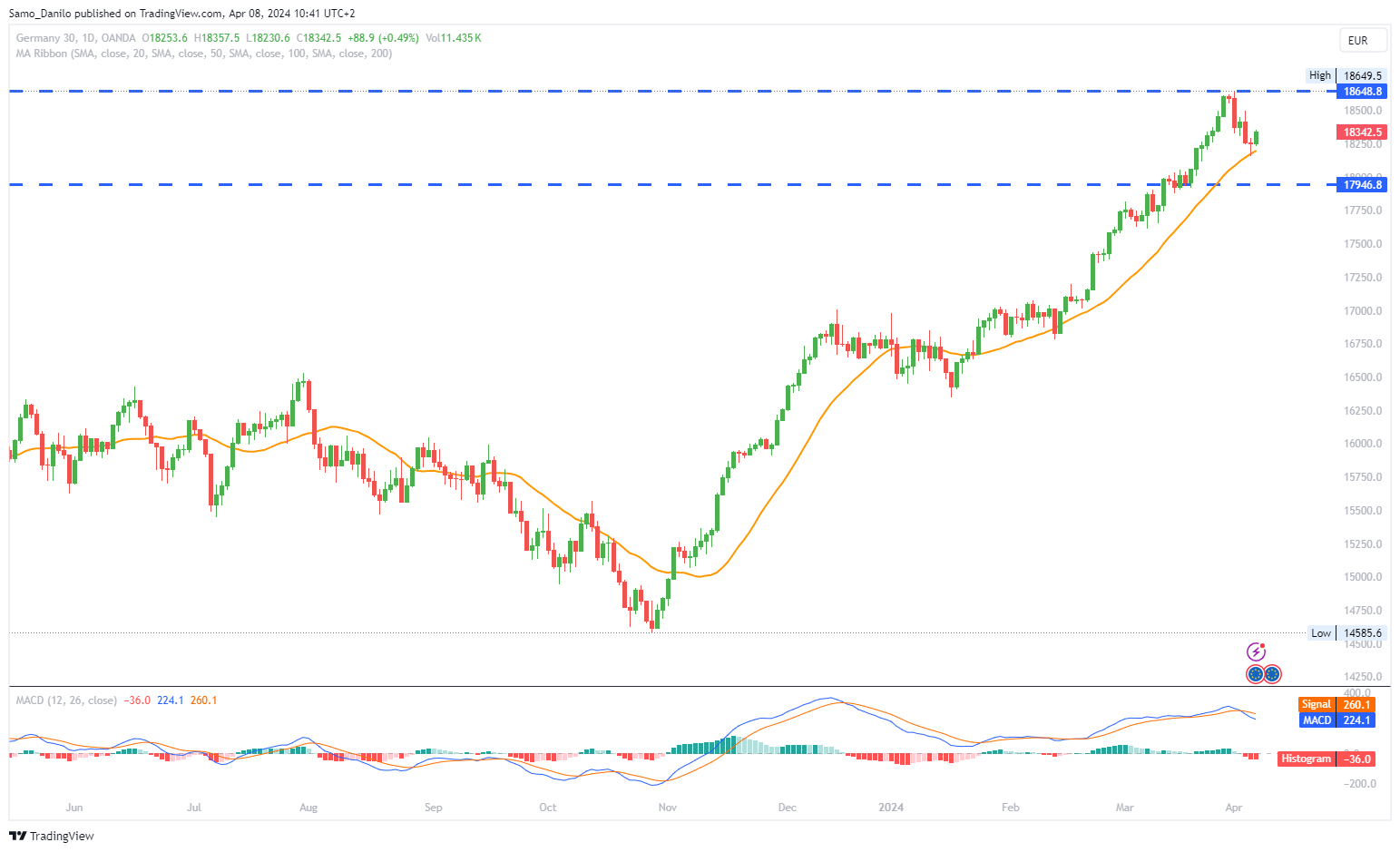EURUSD
- The EUR/USD pair struggles to maintain momentum following Friday's modest rebound from levels below 1.0800, facing renewed selling pressure during Monday's Asian session.
- Strong US employment data, with the Nonfarm Payrolls (NFP) report showing the addition of 303K jobs in March, contributes to the strengthening of the US Dollar against the Euro.
- Despite the positive US economic data, a generally optimistic sentiment in global equity markets, fueled by reduced geopolitical tensions in the Middle East, may limit gains for the safe-haven US Dollar.
- Traders may adopt a cautious approach ahead of key releases from the US, including consumer inflation figures and the Federal Open Market Committee (FOMC) meeting minutes scheduled for Wednesday.
- Market participants are also awaiting the European Central Bank (ECB) meeting on Thursday, which is expected to provide further insights and potential market-moving catalysts for the EUR/USD pair.
Closing statement: Amidst ongoing volatility, the EUR/USD pair faces downward pressure following a modest rebound, as strong US employment data strengthens the US Dollar against the Euro. However, optimism in global equity markets and anticipation of key releases from the US and ECB meetings later in the week may influence trader sentiment and drive market direction for the currency pair.
GBPUSD
- The Pound Sterling halts its recovery from seven-month lows against the US Dollar, facing potential downside pressure with the daily Relative Strength Index (RSI) remaining below 50.00.
- Strong US Nonfarm Payrolls data, showing a robust increase of 303K jobs in March, surpassing expectations, contributes to the US Dollar's strength against the Pound Sterling.
- Comments from Minneapolis Fed President Neel Kashkari raise questions about the necessity of rate cuts if inflation remains stagnant, potentially influencing market expectations for monetary policy.
- Richmond Fed President Thomas Barkin's remarks highlight the challenges in aligning current inflation levels with the criteria for interest rate adjustments, adding to uncertainty surrounding future Fed actions.
- Weak GDP and slowing inflationary pressures in the UK fuel speculation that the Bank of England (BoE) may consider implementing rate cuts, further weighing on the Pound Sterling's performance.
| SMA (20) | Slightly Falling |
|
| RSI (14) | Slightly Rising |
|
| MACD (12, 26, 9) | Slightly Falling |
|
Closing statement: The Pound Sterling's recovery stalls against the US Dollar amid technical vulnerabilities, while strong US Nonfarm Payrolls data reinforces the US Dollar's strength. Comments from Federal Reserve officials on rate cut prospects, along with speculation surrounding potential BoE rate cuts, add to the currency pair's dynamics, shaping market sentiment for GBP/USD trading.
GOLD
- Gold price retreats from its recent all-time high above $2,350 during European trading on Monday, signaling a potential reversal in bullish momentum. A surge in gold purchases by the People’s Bank of China (PBOC) spurred a sudden spike in gold price, reaching a new record high of $2,354, highlighting the influence of central bank actions on precious metal markets.
- The Chinese central bank reported its 17th consecutive month of gold purchases in March, with Bullion reserves rising to 72.74 million fine troy ounces, underscoring continued central bank demand for Gold.
- Market sentiment anticipates strong gold buying by global central banks later in the year, as evidenced by record-high gold demand from central banks in 2022 and 2023, as reported by the World Gold Council (WGC).
- Traders exhibit caution regarding the sustainability of Gold's rally, as repositioning and profit-taking activities may occur ahead of Wednesday's US Consumer Price Index (CPI) release, influencing gold price dynamics in the near term.
| SMA (20) | Rising |
|
|
| RSI (14) | Rising |
|
|
| MACD (12, 26, 9) | Rising |
|
|
Closing statement: Gold price retraces from its recent peak amid central bank purchases and market anticipation of further buying. While central bank demand remains robust, traders exercise caution ahead of key economic data releases, which could impact Gold's trajectory in the coming days.
CRUDE OIL
- WTI crude oil prices opened lower at the beginning of the week, extending the retreat from a five-month peak reached on Friday.
- Israel's withdrawal of soldiers from southern Gaza and commitment to ceasefire talks with Hamas eased concerns about further conflicts and disruptions in crude oil supply from the Middle East.
- Profit-taking in crude oil prices occurred due to the strength of the US Dollar, influenced by positive US Nonfarm Payrolls data.
- Investors remain wary of Ukrainian drone attacks on Russian refineries, contributing to market uncertainty.
- Positive economic data from China, the top importer of crude oil, is driving optimism and supporting the possibility of some dip-buying in crude oil prices.
| SMA (20) | Rising |
|
|
| RSI (14) | Rising |
|
|
| MACD (12, 26, 9) | Rising |
|
|
Closing statement: In summary, crude oil prices experienced a bearish start to the week, with WTI crude oil prices opening lower after touching a five-month peak. While concerns about conflicts in the Middle East eased with Israel's withdrawal from southern Gaza, investors remained cautious due to Ukrainian drone attacks on Russian refineries. The optimism stemming from positive economic data from China supported prospects for potential dip-buying in crude oil prices, despite profit-taking influenced by the strength of the US Dollar.
DAX
- Rising tensions in the Middle East and hawkish comments from the Fed led to a 1.28% decline in the DAX within the opening hour of trading on Friday.
- German factory orders rose by 0.2% in February, following a significant decline of 11.4% in January. However, the increase fell short of economists' expectations of a 0.8% rise, contributing to the DAX's negative performance.
- Weak German retail sales figures also impacted the DAX, with Eurozone retail sales falling by 0.5% after stalling in January.
- Investors will be watching US consumer inflation expectations numbers for March during Monday's session, which could influence DAX performance.
- Additionally, investors are monitoring ECB commentary as they consider the ECB's policy decision, adding to market uncertainty surrounding the DAX.
| SMA (20) | Rising |
|
|
| RSI (14) | Slightly Falling |
| |
| MACD (12, 26, 9) | Slightly Falling |
|
Closing statement: In summary, the DAX experienced a decline driven by escalating tensions in the Middle East and cautious sentiment following hawkish remarks from the Fed. Despite a modest increase in German factory orders, weaker-than-expected retail sales figures and ongoing uncertainty surrounding ECB policy decisions contributed to the DAX's negative performance. Looking ahead, investors will closely monitor US consumer inflation expectations data and ECB commentary for further insights into market direction.
